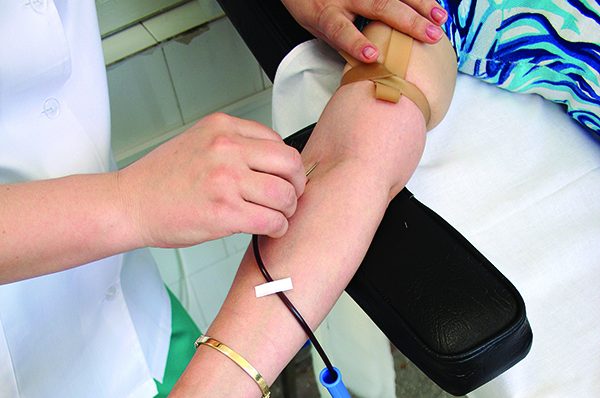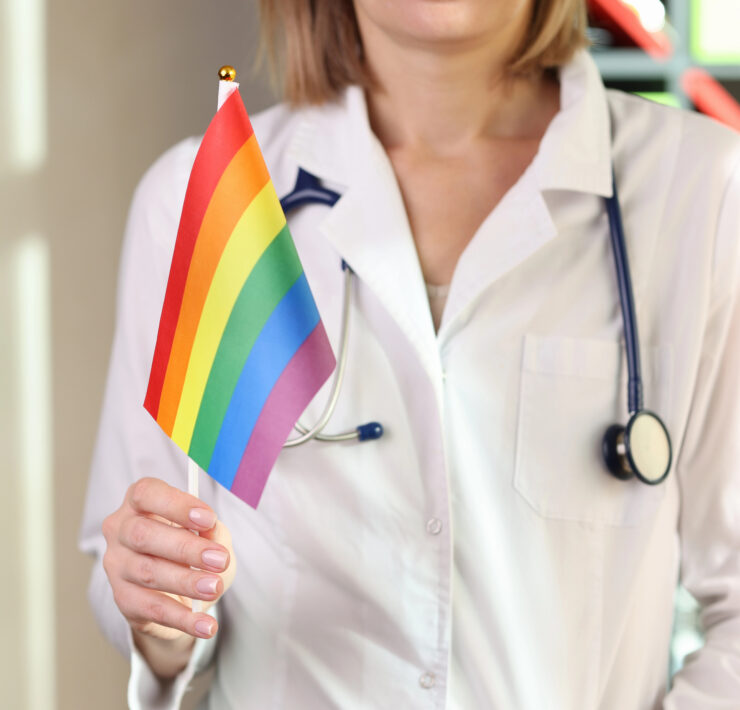Bleeding Hearts: Being LGBT and Donating Blood

On my way to work one Sunday morning of last month, I was stunned to hear the tragic news about the Orlando shooting that left close to 50 innocent people dead at a popular gay bar.
I was even more shocked later that day when I saw photos of long lines of people waiting at blood centers to donate for the victims.
I had never seen anything like it, and it was extremely emotional to watch.
As a pharmacy resident, I spent some time working in a busy emergency department. I helped treat victims of car accidents, stabbings, and — of course — shootings. I’ve watched blood transfusions save patients’ lives, and I applaud all of the caring people who donated this past week for those in need in Orlando.
However, there is a sad irony in this story.
Sexually active gay and bisexual men in the United States are still ineligible to donate blood.
Next to discussions on gun control and terrorism, this heartbreaking event has also started a new conversation about our country’s blood-donation practices.
Blood transfusions are not as benign as you may think. Even if your donation correctly matches your blood type, recipients can develop rare but serious complications including allergic reactions or even hemolytic anemia, a condition where your body begins to eat up too much of your healthy red blood cells. However, there is another risk that relates directly to the LGBT community: disease transmission.
When the HIV epidemic hit in the LGBT population in the 1980s, it was soon discovered that patients were getting infected from HIV-contaminated blood products. Still, uniform testing of donated blood was not required until 1988. Sadly, it was too late.
According to a 2006 article by Dr. Bruce Evatt, a hematologist with the CDC, half of our nation’s hemophiliacs were infected by HIV-contaminated blood between 1981 and 1984. As a result, contaminated blood products became one of our nation’s worst pharmaceutical disasters.
In 1992, the FDA responded by requiring men who have sex with men (MSM) to be excluded from donating blood. If you were male and had sex with a man at least once in your life after 1977, you were considered high risk for contaminating the blood supply and were permanently excluded from donating.
Currently, every unit of blood is quarantined and tested for markers of several infectious diseases, from HIV to Hepatitis B to West Nile Virus. When Dr. Shimian Zou and his colleagues researched American Red Cross blood donation testing in 2008, they found that about 1 in every 36,000 donations tested positive for HIV and were subsequently destroyed. With our current safeguards, they concluded that an HIV-contaminated blood donation had less than a 1 in 1 million chance of making it to a recipient.
Thankfully, Zou’s data suggested that HIV transmission through blood donation is incredibly rare. However, recent cases show that disease transmission from contaminated blood products still occurs.
In 2008, the CDC published a case of a Missouri man who donated blood but did not disclose his sexual encounters with other men when asked about his sexual history. This donor ended up being HIV+, but his viral load was too low to detect at that time. A Colorado patient later became HIV positive after receiving the man’s blood products during a transplant surgery.
Despite this important case, the FDA changed their recommendations in 2015 to allow MSM to donate blood if they had no sexual contact with another man within the past 12 months.
Although the FDA’s step was in the right direction, this still excludes many — if not the majority — of gay and bisexual men, including many HIV-negative men who are in longstanding monogamous relationships.
Donating blood has become one of the most significant ethical challenges I’ve faced since starting my career in healthcare. There have been many instances where I wanted to donate blood in the hope that it could save someone’s life, but the ban has left me with two options.
The first option is to lie about my sexual orientation when asked by blood center staff. I do not advocate that our readers do this, mind you. History has shown that contaminated donations do fall through the cracks, and the consequences could be dire. In addition, I spent enough of my youth lying about my sexual orientation, and I am not starting that habit again.
Now, the shooting in Orlando has sparked a reexamination of our current blood-donation exclusions. One proposal I advocate is to more accurately exclude donors based on more specific HIV risk factors rather than utilizing the somewhat blanket criteria we use now. We already utilize a similar system using specific risk factors to identify patients who are appropriate for PrEP.
With such a system, we could allow people with minimal HIV risk factors to donate while still attempting to protect our blood supply. This is just one of many options that could be discussed by our nation’s leaders and representatives.
Our second option is to urge our eligible friends to donate their blood. I was incredibly moved when I heard that many eligible donors were not only donating blood for the victims, they were also donating on behalf of their ineligible friends in the LGBT community.
The compassion and humanity displayed by these donors helped us triumph on a day shaken by hate. It replaced my anger with pride, and it showed the enormous power we have when we collaborate together through times of adversity.
If you are eligible to donate blood, I urge you to do so, even when we are not in the immediate aftermath of a tragedy. If, like me, you are ineligible to donate, urge others to do so. In the meantime, know that this event has started a complex national conversation on so many important topics, from blood donations to modern gun control. The most important thing is that we think of the victims and their families during these discussions with the hope that we can prevent a similar tragedy from happening again.










